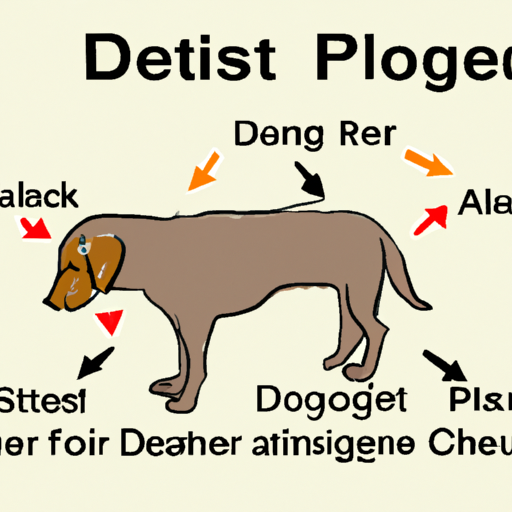As a caregiver to your furry friend, it’s only natural that you may find yourself concerned when your dog vomits. However, it’s important to know that occasional vomiting isn’t always a cause for concern. Dogs vomit for a variety of reasons, and understanding these reasons can help you take better care of your companion. In this piece, we will discuss five main reasons why dogs vomit and what you can do about it.
1. Dietary Indiscretion
One of the most common reasons why dogs vomit is dietary indiscretion. Dogs are curious creatures and often explore the world around them with their mouths, which can lead to them eating things they shouldn’t.
- Eating too quickly or overeating
- Consuming garbage or spoiled food
- Ingesting non-food items like toys, socks, or grass
If your dog’s vomiting is due to dietary indiscretion, you might notice the following:
| Sign | Description |
|---|---|
| Undigested food | You may see pieces of what your dog ate in their vomit. |
| Non-food items | If your dog has ingested something like a toy, you may see pieces of it in the vomit. |
| Vomiting soon after eating | This can be a sign that your dog has eaten too quickly or consumed too much food. |
2. Health Conditions
Certain health conditions can also lead to vomiting in dogs. These include:
- Gastroenteritis: Inflammation of the stomach and intestines
- Pancreatitis: Inflammation of the pancreas
- Kidney or liver disease
- Parasites
If your dog’s vomiting is coupled with lethargy, loss of appetite, or other changes in behavior, it’s crucial to consult your vet immediately.
3. Medications or Treatments
Just like humans, dogs can also have adverse reactions to medications or treatments. Chemotherapy, for instance, is known to cause nausea and vomiting in dogs.
If you suspect that your dog’s vomiting is related to a medication or treatment, it’s crucial not to stop the medication abruptly. Instead, consult your vet to discuss potential adjustments or alternatives.
4. Motion Sickness
Motion sickness is another common cause of vomiting in dogs. This is especially common in puppies and young dogs who are not used to car rides. Symptoms of motion sickness in dogs include:
- Excessive drooling
- Whining or pacing
- Vomiting or retching
5. Stress or Anxiety
Just like humans, dogs can also vomit when they’re stressed or anxious. This can be triggered by a variety of factors, such as a change in environment, loud noises (like thunderstorms or fireworks), or separation from their owners.
FAQs
Q: How can I prevent my dog from vomiting due to dietary indiscretion?
A: You can prevent this by ensuring your dog doesn’t have access to garbage or spoiled food. Also, try to keep small objects out of their reach.
Q: How can I tell if my dog’s vomiting is serious?
A: If your dog’s vomiting is accompanied by other symptoms such as lethargy, diarrhea, loss of appetite, or changes in behavior, it’s best to consult a vet immediately.
Q: What can I give my dog for vomiting?
A: It’s best to consult your vet before giving your dog any medication for vomiting. Over-the-counter human medications may not be safe for dogs.
Q: Can I help my dog with motion sickness?
A: Yes, there are several strategies you can use to help your dog with motion sickness. These include conditioning your dog to car rides by taking them on short, enjoyable trips, and gradually increasing the length of the rides.
Remember, as a caregiver, you play a crucial role in your dog’s health and well-being. By understanding the reasons behind their vomiting, you can take the necessary steps to ensure they get the care they need.



